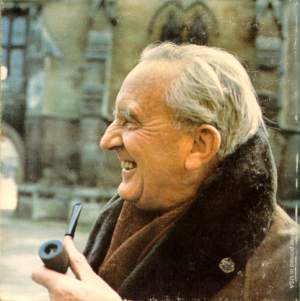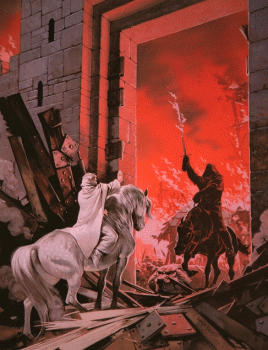Tolkien’s Nobel Snub
 The 1961 nominations for the Nobel prize in literature apparently included The Lord of the Rings, and it seems Tolkien was dismissed rather out of hand for the award, according to an article in the online edition of The Guardian today.
The 1961 nominations for the Nobel prize in literature apparently included The Lord of the Rings, and it seems Tolkien was dismissed rather out of hand for the award, according to an article in the online edition of The Guardian today.
I’m not here to argue whether The Lord of the Rings deserved a Nobel that year. Not having read any of its competition (save for a fair bit of Robert Frost), it would be rather presumptive of me to do so. But I can’t help but notice that the reason for its rejection seems rather flimsy. Nobel jury member Anders Österling wrote in a brief commentary that “The prose of Tolkien – who was nominated by his friend and fellow fantasy author CS Lewis – ‘has not in any way measured up to storytelling of the highest quality’, according to The Guardian.
Tolkien’s prose—which ranged from the colloquial speech of the Hobbits to the high medieval style—is not to everyone’s liking, certainly. Obviously it was not up to par for the Nobel voting panel nor in particular to Österling (who comes across in the article as the Simon Cowell of 1960s literary academics with his scathing comments about Frost and Lawrence Durrell). But we now know that, as a master philologist, Tolkien chose his words with great care and alternated between prose styles for deliberate effect. As Tom Shippey demonstrated in J.R.R. Tolkien: Author of the Century, Tolkien incorporated a modern prose style into Middle-Earth when he chose to do so (for the speech of Saruman and Smaug, for example) as a critique of modernism and the doublespeak of modern politicians. These are contrasted against archaic constructions Tolkien employed to convey deep age and timelessness and a high seriousness to his tale, as in the speech of an Elrond or a crowned Aragorn.
Further, to measure “storytelling of the highest quality” by prose alone (which is rather a matter of taste, and all too subjective) does not seem to be in the spirit of the Nobel award criteria. The Nobel site lists five, including “those who shall have conferred the greatest benefit on mankind” and “to the person who shall have produced … the most outstanding work … in an ideal direction.” Although the popularity of The Lord of The Rings was just beginning to take off in 1961 in a northerly direction that the committee could not have foreseen, a book that is still being read by millions and is routinely voted as one of the best novels of the last 100 years surely rates as outstanding. It must include “storytelling of the highest quality,” Österling’s comment to the contrary notwithstanding.
It can safely be said that it wasn’t Tolkien’s intention to win a Nobel prize when he published The Lord of The Rings. “The prime motive was the desire of a tale-teller to try his hand at a really long story that would hold the attention of readers, amuse them, delight them, and at times maybe excite them or deeply move them,” wrote Tolkien in the book’s foreward. Unfortunately, such stories—and in particular those that include Elves and Orcs and Ents—weren’t in vogue in 1961. The literary landscape was far different then. Literary critics were a small but influential cabal back in the 1950s and 60s. Realism was king. and works like Ulysses and Lolita were the darlings of the academics while fantasy was never accorded serious critical consideration. Released into this atmosphere it’s hardly surprising that The Lord of the Rings was stung by early negative reviews, including a very poor review from Edmund Wilson in his now infamous “Oo, Those Awful Orcs!” (1956). Wilson’s essay has largely been discredited, rife as it is with misinterpretations and misunderstandings and (more pedantically, but telling, I think), misspellings of at least one main character (“Gandalph”). But it demonstrates that a work of unabashed adult fantasy like The Lord of the Rings had no chance at literary awards in the literary environment of the times, when critics like Wilson dismissed The Lord of the Rings as “juvenile trash.”
 Today critical perceptions of the genre are maturing, and while fantasy hasn’t gained the same level of acceptance as “literary” novels we’re starting to see that picture change. Critics had little idea what they were reading when The Lord of Rings was released and it has taken 40-50 years of scholarship to unpack its density. The startling depths revealed therein by academics like Shippey and Michael Drout and Verlyn Flieger have helped to elevate not only the perception of The Lord of the Rings but fantasy as a whole. Comparing Wilson’s review to say, the essays of a Shippey is rather embarrassing for the former. To be fair to Wilson it would have been difficult for an academic in the 1950s to deduce that Tolkien was creating a grand myth for his beloved England from medieval and pre-medieval sources. Less forgivable is the fact that Wilson and others whiffed on Tolkien’s themes of the corruption of power and the dangers of unbridled modernism and its parallels with the great wars of the 20th century.
Today critical perceptions of the genre are maturing, and while fantasy hasn’t gained the same level of acceptance as “literary” novels we’re starting to see that picture change. Critics had little idea what they were reading when The Lord of Rings was released and it has taken 40-50 years of scholarship to unpack its density. The startling depths revealed therein by academics like Shippey and Michael Drout and Verlyn Flieger have helped to elevate not only the perception of The Lord of the Rings but fantasy as a whole. Comparing Wilson’s review to say, the essays of a Shippey is rather embarrassing for the former. To be fair to Wilson it would have been difficult for an academic in the 1950s to deduce that Tolkien was creating a grand myth for his beloved England from medieval and pre-medieval sources. Less forgivable is the fact that Wilson and others whiffed on Tolkien’s themes of the corruption of power and the dangers of unbridled modernism and its parallels with the great wars of the 20th century.
It takes a long time to figure out the big books (see the initial harsh critical reception of Moby Dick for a like comparsion) and time has proven many critics wrong, from the low to the very highest. By any measurable standard The Lord of the Rings has proven to be literature of the highest quality and among the best books of the 20th century, and not just in the fantasy genre (which of course has never been the same since its publication). Today’s Guardian article might afford a few goons in the comments section the opportunity to drop a few elbows on the good professor, but it’s amazing how an “unreadable” work of “turgid” prose continues to stimulate and expand our minds and imaginations for more than 60 years, Nobel or no.
“Some who have read the book, or at any rate have reviewed it, have found it boring, absurd, or contemptible; and I have no cause to complain, since I have similar opinions of their works, or of the kinds of writing that they evidently prefer.” ~ J.R.R. Tolkien
Good piece, Brian. I found this was a really odd story — frankly, the assessment of Tolkien’s prose made me doubt Osterling’s ear for English. And while I value Tolkien over Frost and Forster, the stated reason for not giving either man the prize — that they were too old — was shocking, if not disgusting (how does age impair one’s ability to accept a Nobel Prize?). Basically, it doesn’t look good all around.
I wouldn’t go so far as to say “realism was king.” You have to remember, as far as the Anglo-American literary-critical community was concerned, “Modernism” was at that point as the only “pure” literary art form. And Modernism isn’t about realism at all. It’s about “formal experimentation,” testing the boundaries of what a literary artist can do with narrative, language, representation, etc..
It’s kind of a strange paradox, but Tolkien’s work relies upon a “realist” style derived from 19th century novelistic technique genealogically linked to the novel of manners (e.g. Jane Austen).
Tolkien’s historically unique innovation is that he (1) establishes a reality principle and then (2)(and here is where Modern fantasy is unique) deviates from it.
Thank about it: first chapters of *The Hobbit* and *LoTR* are extended reflections on very domestic things: food orders, planning a party, etc..
Thanks for the though provoking post!
Love that quote, David.
Matthew: I agree, and as I too found the comments on the other nominees more troubling. Also, the very fact that the Guardian led with Tolkien instead of the other authors is a telling sign of his enormous continued influence.
JR: Let me clarify. By realism, I mean novels that are concerned with the events of here and now, of our world. Not the structure or style, but the content, which at that time was predominately focused on individual psychological complexity, explicit social references, etc.
I would say that Tolkien’s novel uses some realist elements to ground the reader in the familiar (ie. the hobbits), and then opens up new (or old, depending on your viewpoint) vistas by showing us unfamiliar cultures (or familiar as distant echoes) and using archaic prose. And personally, I think Tolkien’s work shares more in common with older sources (though he did employ modern techniques when writing LOTR), but that’s just my opinion.